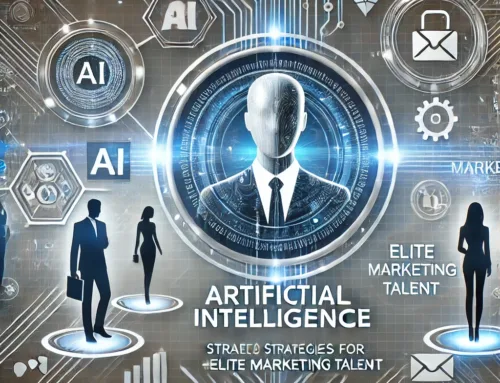Artificial intelligence (AI) is revolutionizing industries across the globe, driving innovation, and creating new opportunities in nearly every sector. As AI continues to evolve, so too does the employment landscape within AI tech companies. From roles in machine learning and data science to emerging positions in AI ethics and regulatory compliance, the AI industry is reshaping what it means to work in technology. This comprehensive guide explores the current trends in AI employment, the challenges facing the industry, and provides insights into the future outlook for roles within AI tech companies.
Current Trends in Artificial Intelligence Employment
1. Increasing Demand for Specialized Skills
As AI technologies become more sophisticated, the demand for specialized skills has surged. Traditional IT roles are evolving, with companies now seeking experts in machine learning, deep learning, natural language processing (NLP), and computer vision. These roles require advanced technical knowledge and the ability to apply AI to solve complex business problems.
AI tech companies’ employment has seen a significant shift toward roles that demand not just coding and programming skills but also an in-depth understanding of AI algorithms and their applications. This trend is particularly evident in sectors such as healthcare, finance, and autonomous systems, where AI is driving major advancements. For example, in healthcare, AI is being used to develop predictive models for patient outcomes and to assist in the diagnosis of diseases. In finance, AI algorithms are optimizing trading strategies and improving fraud detection systems.
As AI continues to mature, the need for professionals who can bridge the gap between AI technology and its practical applications is growing. This demand has led to the creation of new interdisciplinary roles that require a combination of technical, analytical, and business skills.
2. The Rise of Interdisciplinary Roles
AI’s impact is not confined to technical domains; it is creating interdisciplinary roles that bridge the gap between technology and other fields. For instance, AI ethicists and AI policy advisors are emerging as critical roles within AI tech companies. These professionals are tasked with ensuring that AI systems are developed and deployed responsibly, with considerations for ethical implications, bias, and fairness.
AI ethicists, for example, work closely with developers to identify and mitigate potential biases in AI algorithms. They also collaborate with legal and regulatory teams to ensure that AI systems comply with evolving laws and regulations. As AI continues to permeate different aspects of society, the need for professionals who can navigate the ethical and legal complexities of AI will only increase.
Additionally, roles in AI-driven marketing and AI-enhanced customer experience are becoming increasingly important as companies leverage AI to personalize services and optimize customer interactions. Marketing professionals in AI tech companies must be able to translate complex technical concepts into compelling marketing messages that resonate with diverse audiences. They also need to use data-driven insights to refine marketing strategies and measure the effectiveness of campaigns.
The intersection of AI with other fields is creating a diverse range of job opportunities, expanding the traditional boundaries of AI employment. As a result, AI tech companies are increasingly seeking candidates with multidisciplinary backgrounds who can contribute to the development and deployment of AI solutions across various domains.
3. Growth in Remote and Hybrid Work Models
The COVID-19 pandemic accelerated the adoption of remote work, and AI tech companies were quick to adapt. The nature of AI work, which often involves data analysis, coding, and virtual collaboration, makes it well-suited for remote and hybrid work models. This shift has opened up employment opportunities to a global talent pool, allowing companies to recruit the best minds from around the world, regardless of their location.
As remote work becomes more normalized, AI tech companies are increasingly offering flexible work arrangements as a standard part of their employment packages. This trend is expected to continue, providing both employees and employers with greater flexibility. Remote work also offers companies the ability to reduce overhead costs associated with maintaining large office spaces.
However, the shift to remote work also presents challenges, particularly in terms of maintaining team cohesion and ensuring effective communication. AI tech companies are investing in collaboration tools and virtual meeting platforms to address these challenges and to support remote teams. Companies are also rethinking their approach to employee engagement, focusing on building a strong company culture that transcends physical locations.
4. Emphasis on Continuous Learning and Development
The rapid pace of AI innovation means that continuous learning and professional development are critical for staying relevant in the industry. AI tech companies are investing heavily in training and development programs to ensure their employees are equipped with the latest skills and knowledge. This emphasis on learning extends to new hires as well, with companies seeking candidates who demonstrate a commitment to ongoing education.
Continuous learning is not just a requirement for technical roles; it is also important for professionals in areas such as marketing, sales, and project management. For example, AI marketing professionals need to stay up-to-date with the latest tools and techniques for leveraging AI in marketing campaigns. Similarly, AI project managers need to understand new methodologies for managing AI projects and ensuring that they deliver value to the business.
Many AI tech companies are partnering with educational institutions to offer employees access to advanced courses and certifications in AI and related fields. Companies are also encouraging employees to attend industry conferences, participate in online workshops, and engage in self-directed learning. By fostering a culture of continuous learning, AI tech companies can ensure that their workforce remains agile and capable of adapting to new challenges.
Future Outlook for AI Employment
1. Expansion of AI-Driven Industries
As AI continues to mature, its adoption will spread across more industries, driving demand for AI professionals in sectors that have traditionally been slower to adopt new technologies. For example, AI is expected to play a significant role in areas such as agriculture, supply chain management, and environmental sustainability. This expansion will create new employment opportunities and require AI professionals to develop expertise in these specific industries.
In agriculture, AI technologies are being used to optimize crop yields, monitor soil health, and improve the efficiency of farming operations. AI professionals with expertise in agricultural sciences and data analytics will be in high demand as the agriculture industry increasingly adopts AI-driven solutions.
Similarly, in supply chain management, AI is being used to enhance inventory management, optimize logistics, and predict demand. As supply chains become more complex and globalized, the need for AI professionals who can develop and implement AI solutions to streamline operations will grow.
Environmental sustainability is another area where AI is expected to have a significant impact. AI technologies are being used to monitor and reduce carbon emissions, manage natural resources, and develop renewable energy solutions. AI professionals with a background in environmental science and engineering will be essential for driving the adoption of AI in this field.
2. The Rise of AI Governance and Compliance Roles
With the increasing integration of AI into critical business operations, the need for governance, compliance, and regulatory oversight is becoming more pronounced. Future roles in AI governance will focus on ensuring that AI systems comply with legal standards and ethical guidelines. Professionals in these roles will be responsible for navigating complex regulatory environments and ensuring that AI technologies are deployed safely and responsibly.
As governments and regulatory bodies introduce more stringent AI regulations, companies will need to recruit professionals who can develop and implement AI governance frameworks. These professionals will need to work closely with legal teams, data scientists, and AI developers to ensure that AI systems are transparent, accountable, and fair.
Recruitment for AI governance and compliance roles is expected to grow, especially as AI becomes more integrated into industries such as healthcare, finance, and transportation. In these industries, the consequences of deploying AI systems that do not comply with regulations can be severe, including legal penalties, reputational damage, and financial losses.
3. Ethical AI and Responsible AI Development
As AI systems become more powerful, concerns about their ethical implications will continue to grow. Future employment opportunities will increasingly focus on developing and implementing AI systems that are fair, transparent, and accountable. Roles in AI ethics, fairness, and bias mitigation will become central to AI tech companies’ efforts to build trust with users and stakeholders.
Hiring for artificial intelligence roles that focus on ethical AI development will require candidates with a deep understanding of both AI technologies and ethical principles. These professionals will need to be able to identify potential biases in AI algorithms, develop strategies to mitigate these biases, and ensure that AI systems are designed and used in ways that benefit society.
As AI becomes more integrated into everyday life, the importance of ethical AI development will only increase. Companies that prioritize ethical AI practices will be better positioned to build long-term trust with their customers, regulators, and the public.
4. Integration of AI into Everyday Business Operations
AI is no longer confined to research labs and tech startups; it is becoming a core component of everyday business operations. As AI tools and platforms become more accessible, companies of all sizes are integrating AI into their workflows to improve efficiency, reduce costs, and enhance decision-making.
This integration will create a demand for AI professionals who can deploy AI solutions across various business functions, from human resources and finance to customer service and supply chain management. AI tech companies’ recruitment efforts will increasingly focus on finding talent that can bridge the gap between AI technology and business strategy, enabling companies to fully leverage AI’s potential.
For example, in human resources, AI is being used to streamline the recruitment process, identify top talent, and improve employee engagement. AI professionals with expertise in HR and data analytics will be essential for developing and implementing these solutions.
In finance, AI is being used to enhance risk management, optimize investment strategies, and improve customer service. AI professionals with a background in finance and machine learning will be in high demand as the finance industry continues to adopt AI-driven solutions.
How AI Tech Companies Can Prepare for the Future
To stay competitive in the rapidly evolving AI landscape, AI tech companies need to be proactive in addressing the challenges and opportunities presented by the future of AI employment. Here are some strategies to consider:
1. Invest in Talent Development
Continuous learning and development are critical for keeping up with the fast-paced advancements in AI. AI tech companies should invest in upskilling their workforce, providing opportunities for employees to learn new skills and stay abreast of the latest AI trends. This can be achieved through in-house training programs, partnerships with educational institutions, and support for professional certifications.
In addition to technical training, companies should also focus on developing soft skills such as communication, collaboration, and problem-solving. These skills are essential for success in interdisciplinary roles and for effectively integrating AI into business operations.
2. Foster a Culture of Innovation and Inclusion
Creating a culture that encourages innovation and values diverse perspectives is essential for attracting and retaining top AI talent. AI tech companies should prioritize diversity, equity, and inclusion (DEI) initiatives to ensure that their workforce reflects the diversity of the communities they serve. This not only drives innovation but also helps companies build AI systems that are fair and unbiased.
Inclusion is particularly important in the development of AI systems, as diverse teams are more likely to identify and address potential biases in AI algorithms. By fostering an inclusive culture, companies can ensure that their AI systems are designed to benefit all users, regardless of their background.
3. Embrace Remote and Hybrid Work Models
The shift to remote and hybrid work is likely to continue, and AI tech companies should embrace this trend by offering flexible work arrangements. By doing so, companies can access a broader talent pool and attract top candidates who value work-life balance and flexibility.
To support remote teams, companies should invest in collaboration tools and technologies that facilitate virtual communication and project management. They should also develop strategies for maintaining team cohesion and ensuring that remote employees feel connected to the company culture.
4. Build Expertise in AI Governance and Ethics
As AI governance and ethics become increasingly important, AI tech companies should build expertise in these areas. This includes recruiting professionals with experience in AI policy, compliance, and ethics, as well as developing internal frameworks to guide the responsible development and deployment of AI systems.
By taking a proactive approach to AI governance and ethics, companies can mitigate risks, build trust with stakeholders, and ensure that their AI systems are aligned with legal and ethical standards.
Conclusion
The future of artificial intelligence employment is full of opportunities and challenges. As AI technologies continue to evolve, so too will the roles and skills required within AI tech companies. By staying ahead of industry trends and investing in talent development, AI tech companies can position themselves as leaders in the AI revolution.
TreelineInc.com is committed to helping AI tech companies navigate the complexities of AI employment. With our deep industry knowledge and expertise in AI recruitment, we are here to connect companies with the top talent they need to succeed in this dynamic field.
Looking to stay ahead in AI employment trends? Contact TreelineInc.com today for a consultation or to learn more about our AI recruitment services. Visit our contact page to get started.
References:
- McKinsey & Company: The Future of Work in Technology
- World Economic Forum: AI Is Shaping the Future of Work
- Harvard Business Review: The Role of AI in the Future of Work
This article aims to educate AI tech companies on current employment trends and future opportunities, establishing TreelinInc.com as a thought leader in AI employment.
Share This Story, Choose Your Platform!
What our happy clients are saying
Contact Us for a Free Consultation
Tell us more about your business and how we can help.












